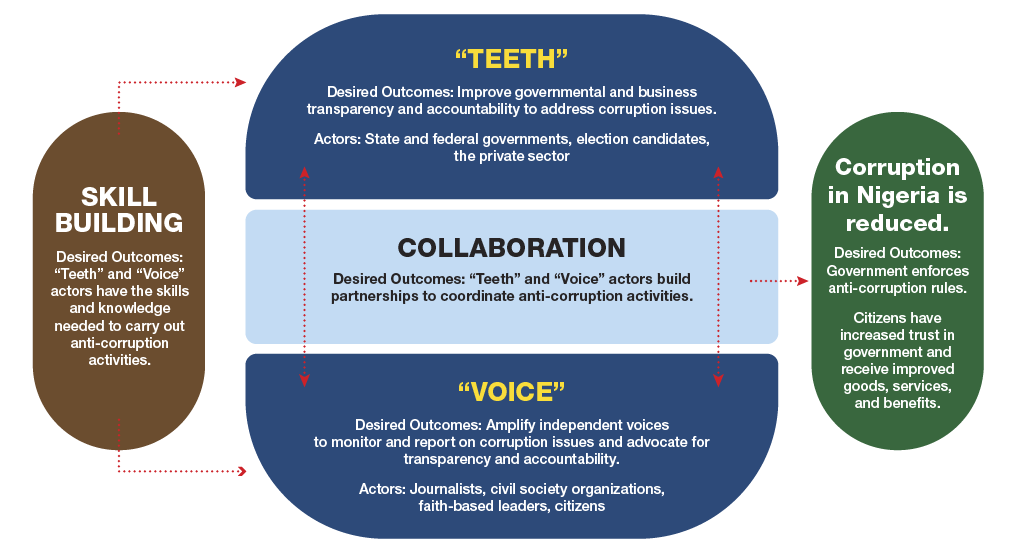
Our early On Nigeria theory of change uses the interplay between empowered resident voices calling for change and accountability from the bottom up, combined with top-down government laws, regulations, government champions and reformers, and other methods of enforcement working together to reduce corruption. This sandwich strategy drives a virtuous cycle of accountability from state and society, leaving less room for corrupt practices to fester. It is grounded in work by Jonathan Fox, a professor of development studies at American University’s School of International Service and Director of the Accountability Research Center. While it promotes transparency, participation, and accountability (TPA) in Nigeria, the sandwich strategy can also be applied to a diversity of contexts and themes.

MacArthur supported a series of case studies on sandwich strategy initiatives to analyze how they drive change in Nigeria and in the global South. The studies focus on themes including education, health, gender, housing, social protection, electoral reforms, and environmental protection in countries including Bangladesh, Bolivia, Brazil, China, Colombia, India, Mexico, Nigeria, Pakistan, Peru, The Philippines, and Sri Lanka.
The comparative study, published in World Development, will expand knowledge about the dynamics of reform, strengths, and limitations of the strategy. It aims to strengthen the entire field working in transparency, participation, and accountability. Accountability Research Center carried out the 19 studies, posted below as they become available.
Case Studies
- Delivering Collective Afrodescendant Land Rights: Mutual Empowerment in Colombian State-Society Coalitions 1995-2003: Grassroots groups of Black activists in Columbia organized to advance territorial rights, taking advantage of the 1991 constitution and 1993 law that recognized Afrocolumbian rights to ethnic territories.
- Pakistan's National Commission on the Status of Women: The Commission intended to reduce risks for citizen activists while consolidating support policy reforms in the courts and parliament. The advocacy achieved legal reforms, but the Commission has limitations within the state bureaucracy.
- The Mixed Legacies of Bolivia’s 1994 Law of Popular Participation and Implications for the Promotion of Indigenous Agency: Six cases in Bolivia show the program’s intent and impact as it worked to empower grassroots organizations and Indigenous communities in local government.
- ‘Constructive Accountability’: Sandwich Strategy for Textbook Delivery in the Philippines: A partnership between civil society organizations (CSOs) and government to reduce corruption and improve efficiency in supplying learning materials to schools.
- Enabling Powershifts: KALAHI in the Philippines as a Sandwich Strategy Case: Community volunteers and CSO leaders worked in a participatory process with a government program aimed at reducing poverty.
- Economic Accountability and Pro-Poor Forest Sector Reforms in Mexico: Agrarian reforms in Mexico allowed ‘community forest enterprises’ to emerge, resulting in small community holders managing enterprises and conserving more land.
- Collaboration and Contestation: State Actors and MST Activists Reforming Rural Education: The Landless Workers Movement (MST) has succeeded at redistributing land in Brazil, but also advocated for direct community input in public education.
- Enabling Citizens’ Collective Actions towards Improving Transparency and Accountability through the District Health System in Enugu State: A governor created reforms for transparency in the delivery of healthcare in Enugu State in Nigeria and catalyzed health facilities and communities to engage from below.
- Reforming Nigeria’s Independent National Electoral Commission (INEC): A Sandwich Approach to Electoral Accountability 2010–2015: INEC focused on electoral governance and shifted toward citizen monitoring.
- Agents of Change Beyond Healthcare: Lessons from the Mitanin (Community Health Worker) Program in India: Women community healthcare volunteers drove engagement in issues beyond their specific intervention, including food, employment, rights, and violence.
- State-led Social Audits: Enabling Citizen Oversight in India’s National Rural Employment Guarantee (NREGA) Program: NREGA entitles adults to the right to 100 days of paid work, with social audits and citizen participation built in to prevent corruption.
- Square-rule Paper Engineers: People, Power, and Participation in Sri Lanka’s Million Houses Programme: In 1984-89 a housing program used a state-supported “people’s process” to come up with creative opportunities to provide housing.
- HIV/AIDS Policy in Brazil: State / Society Partnerships in an ‘Island of Excellence’: CSOs in Brazil helped mobilize advocacy, networking, and delivery of HIV/AIDS services.
- Akasa Afaifai: Improving Accountability in the Budget Implementation Process: A Case Study from Kano: In Kano state, Nigeria, state government began distributing meeting minutes and budget plans, and a local radio program helped distribute the information and hold the government accountable.
- The Sandwich Strategy: Opening from Above Meets Mobilization from Below in Monitoring the Ogun State Home-Grown School Feeding (HGSF) Program: Nigeria’s HGSF program partnered with local farmers and cooks to feed school children with community monitoring to ensure resources were delivered at high quality.
- Third Party Monitoring of National Social Investment Programs in Nigeria – An Uncommon Opening from Above: International and local CSOs alongside community-based organizations served as watchdogs over social protection programs with the vice president’s support until 2019 when the program switched ministries.
- Jointly Promoting Accountability in Health Care: Strategic Alliances Between Citizen Monitors and the Human Rights Ombuds Office in Southern Peru: A coalition of civil society actors, including a group of Indigenous women volunteers, partnered with government branches and international organizations to monitor the quality of health service delivery in remote Andean communities.
- Anti-Domestic Violence Policy in Bangladesh: Did Voice Trigger Teeth?: Women’s rights advocates established a coalition that created a draft anti-domestic violence law in Bangladesh, and they used research and leverage to agitate for the law to pass in 2010.
Jonathan Fox and Rachel Sullivan Robinson of American University’s School of International Service presented their sandwich strategy research as part of USAID's Evidence and Learning seminar series. Watch the 20-minute presentation followed by Q&A.



